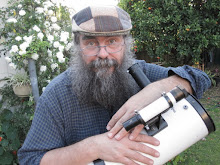The Last Quarter Moon is Thursday October 24. Comet C/2023 A3 is rising into darker skies, but fading and is visible in binoculars. Venus is in the the Scorpion and is close to the red star Antares on the 26th. Mercury is low in the twilight below Venus. Saturn is in the north-eastern skies. Mars and Jupiter continue to draw apart. Mars forms a line with the bright stars Castor and Pollux and the last quarter Moon.
The Last Quarter Moon is Thursday October 24.
Western evening
sky on Saturday, October 26 as seen from Adelaide at 20:38 ACDST (60 minutes
after sunset, click to embiggen).
Venus is readily visible and is now visible when the sky is fully dark. Venus is in the head of the Scorpion, close to the bright star Aldebaran, alpha Scorpii. Mercury and Comet C/2023 A3 are below it.
You will need binoculars to see the comet. The inset is the telescopic view of Venus at this time.
Similar views will be seen from the rest of Australia at the equivalent local time (60 minutes after sunset).
The north-eastern sky at 21:11 ACDST Saturday, October 26 as seen from Adelaide (90 minutes after sunset).
Saturn is past opposition and is visible all night long. The inset shows the telescopic view at the time. (click to embiggen).
Similar views will be seen from the rest of Australia at the equivalent local time (90 minutes after sunset).
North-eastern morning
sky on Thursday, October 24 as seen from Adelaide at 05:24 ACDST (60
minutes before sunrise), Mars and Jupiter form a line with the red star
Aldebaran. Mars forms a line with the bright stars Castor and Pollux and the Last Quarter Moon.
The inset is the telescope view of the Jupiter at this time.
Similar views will be seen from the rest of Australia at roughly the equivalent local time (60 minutes before sunrise).
Eastern evening
sky on Thursday, October 24 as seen from Adelaide at 20:36 ACDST (60
minutes after sunset), C/2023 A3 Tsuchinshan-ATLAS may be theoretically unaided eye visible in the twilight. But in practice you nee to be in a dark sky site in northern Australia. The rest of us need binoculars. The chart shows the position of the comet every night over the coming week.
Spectacular photos continue to be see, but they again are all long exposures, the unaided eye view is less impressive, but still well worth viewing although binoculars are needed. The comet is rising higher into the darker twilight, but fading as it goes.
Similar views will be seen from the rest of Australia at the equivalent local time (60 minutes after sunset).
Binocular view of the eastern evening
sky on Thursday, October 24 as seen from Adelaide at 20:36 ACDST (60
minutes after sunset), C/2023 A3 Tsuchinshan-ATLAS showing the Guide stars that will help you find the comet.
Similar views will be seen from the rest of Australia at the equivalent local time (60 minutes after sunset).
Whole sky on Saturday, October 26 as seen from Adelaide at 21:11 ACDST, 90 minutes after sunset (click
to embiggen).
Saturn is now above the northeastern horizon as Venus sets on the western horizon. Scorpius is now prominent in the west with the heart of the milky way now just off the zenith. The Southern Cross is low in the Southern sky. The moon is rising later and the fainter clusters and nebulae are once again coming into view.
Elsewhere
in Australia will see a similar view at the equivalent time (90 minutes after sunset).
Mercury is now visible in the evening twilight below Venus.
Venus climbs higher in the evening twilight and is readily visible in the evening twilight. Venus is in the the Scorpion this week and close to the bright red star Antares.
Mars is rising in the morning sky and near Jupiter. The pair continue to draw apart as as Mars passes through Gemini forming a line with Castor and Pollux and the last quarter moon on the 24th.
Jupiter is rising in the the morning twilight sky. Jupiter is below the red star Aldebaran forming a line with Mars. Jupiter is now rising before midnight but is best in the morning.
Saturn is high in the evening sky. Saturn is visible all night long.
Labels: weekly sky
# posted by Ian Musgrave @ 11:40 pm










 Click to read about or order
Click to read about or order Click to read about or order
Click to read about or order Click to read about or order
Click to read about or order Click to read about or order
Click to read about or order




